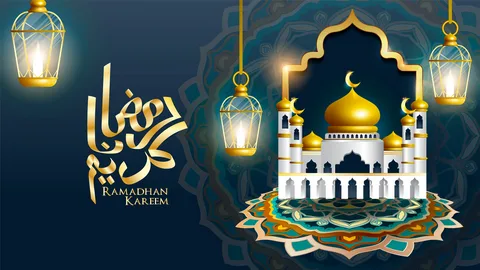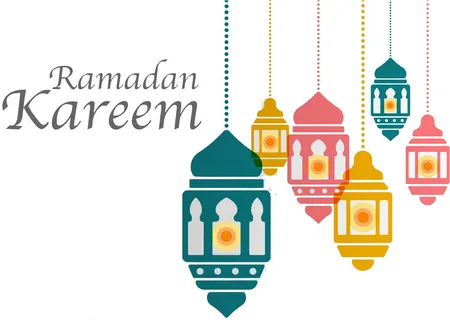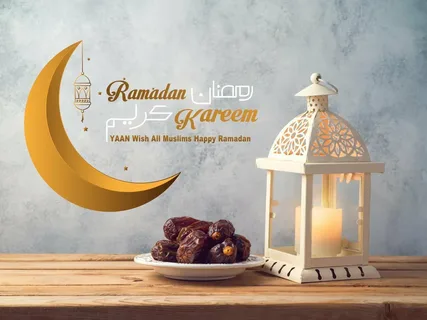Ramadan, the holiest month in Islam, is a time of reflection, spiritual growth, and community. As Muslims around the world observe fasting from dawn till sunset, they also engage in various customs and traditions, one of which is exchanging ramadan greetings to express well wishes and blessings during this sacred time.
Introduction to Ramadan

Ramadan is the ninth month of the Islamic lunar calendar, known for its significance as the month of fasting (Sawm). It commemorates the revelation of the Quran to Prophet Muhammad (peace be upon him) and is observed by Muslims worldwide as a period of fasting, prayer, reflection, and community.
Significance of Ramadan
Spiritual Significance
Ramadan holds immense spiritual significance for Muslims, as it is believed to be a time of increased blessings, forgiveness, and mercy from Allah (God). Fasting during Ramadan is one of the Five Pillars of Islam, which are the foundation of a Muslim’s faith and practice.
Cultural Significance
Beyond its religious importance, Ramadan is deeply ingrained in the cultural fabric of Muslim societies. It is a time when families come together for pre-dawn meals (Suhoor) and break their fasts together at sunset (Iftar), fostering a sense of unity and solidarity within communities.
Ramadan Greetings: Meaning and Importance
Ramadan greetings are expressions of goodwill, blessings, and prayers exchanged among Muslims during the holy month. They serve as a way to show kindness, empathy, and solidarity with one another, reinforcing the bonds of brotherhood and sisterhood within the Muslim ummah (community).
Traditional Ramadan Greetings
In traditional Islamic culture, various greetings and phrases are commonly used to convey well wishes during Ramadan.
Arabic Greetings
Phrases like “Ramadan Mubarak” (Blessed Ramadan) and “Ramadan Kareem” (Generous Ramadan) are widely used to greet others during the month. These greetings carry profound meanings of blessings, mercy, and generosity, reflecting the spirit of Ramadan.
Common Phrases
Additionally, expressions such as “May Allah accept your fasts and prayers” and “Wishing you a blessed month of Ramadan” are commonly exchanged among Muslims as a way to convey heartfelt wishes and prayers for each other’s spiritual well-being.
Modern Ramadan Greetings
With the advent of technology and the prevalence of social media, the way Ramadan greetings are exchanged has evolved.
Social Media Greetings
Platforms like Facebook, Twitter, and Instagram have become avenues for Muslims to extend Ramadan greetings to friends, family, and followers across the globe. From sharing heartfelt messages to posting festive images and videos, social media has revolutionized the way people connect and celebrate during Ramadan.
Virtual Greetings
In an increasingly digital world, virtual greetings in the form of e-cards, animated GIFs, and video calls have become popular ways to convey Ramadan wishes. These digital greetings offer convenience and accessibility, allowing people to reach out to loved ones regardless of geographical distances.
Ramadan Greetings Etiquette

Understanding the etiquette surrounding Ramadan greetings is essential for fostering respectful interactions during the holy month.
Greeting Muslims During Ramadan
When greeting Muslims during Ramadan, it’s customary to use appropriate phrases like “Ramadan Mubarak” or “Ramadan Kareem” to convey blessings and well wishes. These greetings are universally recognized and appreciated by Muslims worldwide.
Responding to Ramadan Greetings
If someone extends Ramadan greetings to you, it’s polite to respond with a similar greeting or a heartfelt thank you. Acknowledge the sender’s kindness and reciprocate their good wishes, fostering goodwill and camaraderie within the community.
Importance of Ramadan Greetings in Building Relationships
Ramadan greetings play a vital role in fostering connections and strengthening relationships within the Muslim community and beyond.
Strengthening Bonds
By exchanging greetings and blessings during Ramadan, Muslims reaffirm their bonds of brotherhood and sisterhood, fostering a sense of unity and solidarity within the ummah. These interactions contribute to building stronger and more resilient communities.
Fostering Inclusivity
Ramadan greetings also serve as a means of inclusivity, welcoming people of all backgrounds to participate in the spirit of the holy month. By extending heartfelt wishes and blessings to friends, neighbors, and colleagues, Muslims promote mutual respect and understanding.
The Evolution of Ramadan Greetings
The tradition of exchanging Ramadan greetings has evolved over the centuries, reflecting changes in technology, culture, and society.
Historical Perspective
Historically, Ramadan greetings were exchanged through handwritten letters, verbal expressions, and communal gatherings. These traditional forms of communication reflected the cultural norms and values of their time, emphasizing personal connections and community engagement.
Influence of Technology
With the advent of modern technology, the way Ramadan greetings are exchanged has undergone a significant transformation. From email newsletters to social media posts, technology has made it easier than ever to connect with loved ones and share blessings during Ramadan.
Impact of Ramadan Greetings in the Digital Age
In the digital age, Ramadan greetings have taken on new forms and meanings, reflecting the evolving ways in which people connect and communicate.
Social Media Trends
Social media platforms like Facebook, Twitter, and Instagram have become hubs for sharing Ramadan greetings, inspiring hashtags, and viral campaigns that unite Muslims around the world. From virtual Iftar parties to live streams of Taraweeh prayers, social media has revolutionized the way people experience and celebrate Ramadan.
Virtual Celebrations
In light of the COVID-19 pandemic and social distancing measures, virtual celebrations have become increasingly popular during Ramadan. Muslims have embraced video calls, online forums, and virtual events to stay connected with loved ones and participate in communal activities while observing safety guidelines.
Challenges in Sending Ramadan Greetings
Despite the widespread practice of exchanging Ramadan greetings, certain challenges and considerations arise in the process.
Language Barriers
In multicultural and multilingual societies, navigating language barriers can pose a challenge when sending Ramadan greetings. Finding appropriate translations and expressions that resonate with diverse audiences requires sensitivity and cultural awareness.
Cultural Differences
Cultural differences in etiquette and customs may impact the way Ramadan greetings are received and interpreted. It’s essential to be mindful of cultural sensitivities and practices when extending greetings to individuals from different backgrounds.
FAQs
Can non-Muslims send Ramadan greetings?
Yes, non-Muslims can send Ramadan greetings as a gesture of respect and goodwill towards their Muslim friends, neighbors, and colleagues.
What are some common phrases used in Ramadan greetings?
How can I send virtual Ramadan greetings?
You can send virtual Ramadan greetings through email, social media platforms, or messaging apps by sharing heartfelt messages, images, or videos.
Is it appropriate to send Ramadan greetings to someone fasting?
Yes, it is appropriate to send Ramadan greetings to someone fasting as a way to express support and encouragement during this spiritually significant time.
What should I do if I receive Ramadan greetings but am not fasting?
You can graciously accept the greetings and respond with a similar message or a heartfelt thank you, acknowledging the sender's kindness and good wishes.
Conclusion
Ramadan greetings are more than just words; they are expressions of goodwill, blessings, and prayers that foster unity, compassion, and solidarity within the Muslim community and beyond. Whether exchanged in person, through social media, or virtually, these greetings serve as a reminder of the importance of connection, empathy, and kindness during the holy month.

